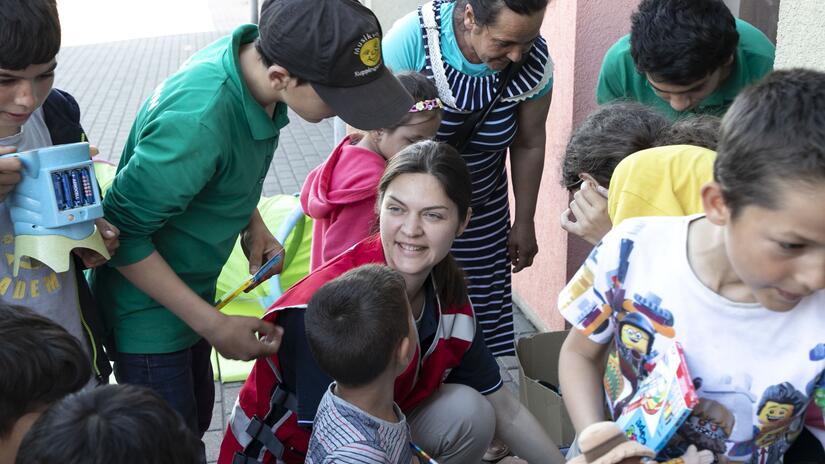We had already packed our passports in the bag. Living in Kyiv, we were already witnessing tension in the air and watching the news of what was happening near the border of Ukraine. We had accepted we would probably need to seek safety outside the house at some point.
But that night came so much sooner than we expected. Loud bangs and flashes through the window startled us awake, crisis landing at our doorstep.
My seven-year-old daughter and I traveled to our relatives’ home just a few hours away. It was anything but an easy decision to leave our cozy, familiar home on the edge of the city next to the woods where we loved to walk on the weekends. We were so happy there, but we knew it was no longer safe for us to stay.
The journey was surreal. Music on the car radio was playing as if nothing was happening, yet all around us were sounds of war. And no sooner than when we arrived at our family’s home, we realized it was yet again too dangerous to stay.
Over the next several days, we continued moving from place to place moving toward the western part of Ukraine, expecting the conflict to follow us.
The upheaval took a toll quickly, especially on my daughter. I am a professional psychologist by training, so I knew exactly what to look out for to identify those signs of severe stress. Several times a night, we woke up to the sound of air sirens and alarms. She refused to sleep in her pajamas and instead insisted to sleep in winter clothes. She did not sleep at all, really. For fear of having to get back up and seek safety. She was scared all the time, her toy bear providing only so much comfort.
That was when I knew we needed to leave the country. We knew a few people in Poland, also from Ukraine, who had been helped by the welcoming Polish community. They had gone above and beyond to help shelter families fleeing Ukraine.
Everything about my life was turned upside-down overnight. Even the familiarity with my profession as a humanitarian worker and psychologist for the International Committee of the Red Cross, (ICRC). There, my job was to support families of missing persons in Ukraine. But when the conflict started, we all switched gears, fully focused on the emergency in front of us.
I was one of the original staff members who trained Red Cross volunteers in providing psychosocial first aid to people in distress. Ukrainian Red Cross volunteers put so much effort from the very beginning of the crisis into helping people in need. I also taught them how to recognize if they needed to seek help for themselves. And now, it seemed we all needed that.
Having worked with the Red Cross for years, I tried to do my best to support them in their lifesaving work using my skills.
Together with my ICRC team, we created hotlines for people who needed psychological help – the same support I needed myself.
Crossing the border to Poland, we were welcomed by kind volunteers just as we were when we were on the way in Ukraine. Volunteers provided us food, and toys for my daughter-simple acts that made me feel so much better. This, I noticed, seemed to be a turning point for my daughter, and soon she was back to sleeping and playing with the other kids.
Not long after we arrived in Poland, I was at the bank when a woman also from Ukraine heard my voice – the same language she spoke and started sharing her own story with me. She started to cry. That was when I knew she needed me to listen.
She wanted to share her story with someone who would take the time to sit alongside her in her pain. It’s what so many people crave, often lacking words to express it. It became clear to me that this was a way I could contribute using my skills, especially now that I had more capacity to care for others while feeling safe myself.
I reached out to my colleagues at the International Federation of Red Cross and Red Crescent Societies (IFRC) and am now helping to lead a program in countries neighbouring Ukraine to provide mental health and psychosocial support to people who have fled Ukraine, which includes many different activities where volunteers can support people by using psychological first aid skills, organizing child-friendly spaces, offering referrals to other service providers and much more.
Wounds of war are deep, sometimes too deep to manage alone.
I don’t know when I’ll be able to go back home and help my people in Ukraine. It’s still not safe to return. For now, I can only plan a few days ahead. When I can – when any of us can – we’ll return home to that simple joy we once felt before.
--
Nataliia K is a Mental Health and Psychosocial Support Delegate with the International Federation of Red Cross and Red Crescent Societies. She helps give back to people who have endured more than 100 days of crisis at home in Ukraine. She is from Kyiv.





